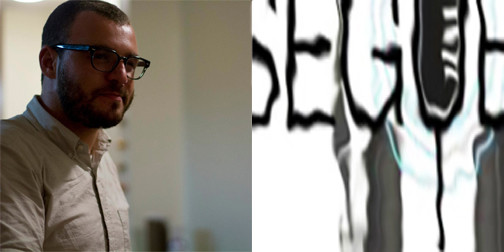The Introductions of Josef Kaplan

If you haven't attended the December-January Segue events these past two years, you have missed something. Josef Kaplan's introductions. Most weeks, as they unfold, you can observe something come over the room. Some weeks it's like a wave of something between shock and glee. Other weeks it's just lots of audience reaction, hysterical laughter, conversations erupting, the occasional person turning away in discomfort. These introductions have been described as uproarious, sweet, insulting, naive, hilarious, and courageous. Many seem to agree he's exploding the form.
Rumor has it Ugly Duckling is planning to make a chapbook of a select few.
When asked if anything seemed special about what's happening here, James Sherry, who has been steering Segue for over thirty years, says, "Josef breaks the tradition of laudatory introductions with confrontational framing such as saying that he doesn’t understand the poet’s work." Sherry points to Kaplan's Michael Gottlieb intro, describing it as, "psychological rhetoric layered on satiric imitation creating an uproarious surface" that "exposed Michael’s social critique as a personal complaint." But what's equally extraordinary is how funny and loving it all seemed when it was happening. Michael laughed harder than anyone. Steve Zultanski, Segue co-curator with Kaplan for two years, described it as, "confusing and borderline insulting, but in the sweetest way."
When I sent Rob Fitterman interview questions for this piece, he turned around and wrote a piece of his own on the topic, which I will post tomorrow. I wonder if he was thinking of the Gottlieb intro when he wrote there, "it is an honor to be hammered beautifully." Fitterman describes Kaplan's introductions as performing a reading process, placing the introducer-performer at "the polar opposite of literary fundamentalism," where the introducer lets "the work of the writer he is about to introduce dictate a slippery procession." And if Kaplan's work is any indication, approaching the poetry introduction as an act of naive reading does allow a lot of space for generative questioning and humorously revealing reading errors, but also often arrives at what seem like basic truths about the work that have gone unnoticed, or maybe just unspoken, in a way everyone seems to feel comfortable laughing about, maybe even relieved to hear.
The stakes are high for a Segue introduction. That audience has been hearing performative, theoretically informed introductions for thirty years. Sherry says of this, "Segue introductions verge on independent literary works. I have supported that approach in the years that I have been responsible for the series." In a scene that takes the introduction seriously as a form, getting a complex and original audience reaction, as Kaplan's introductions have, suggests not only an intervention in the form but an interventon in the scene.
Gossip or history